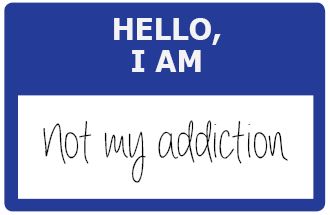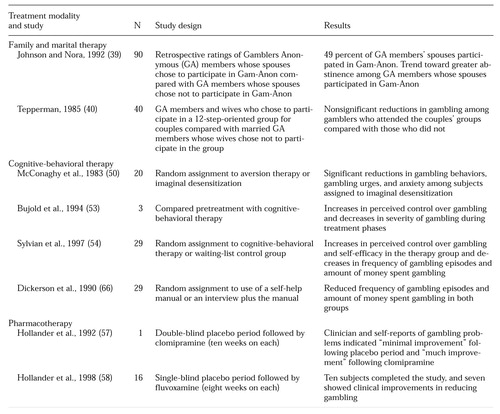Cognitive Behavioral Therapy Gambling
4/10/2022 admin
Cognitive Behavioral Therapy Gambling Rating: 6,9/10 7801 reviews
Video Transcript: Cognitive-behavioural Therapy Clinical Simulation Therapist: So, Liz, I want to come back to something that you said earlier, when you were talking about feeling triggered and then going gambling. On-screen text: Therapist's Thoughts: I wonder how far back she first felt triggered? When did she then make the decision to gamble? Cognitive Behavioral Therapy for pathological Gambling Cognitive behavioral therapy (CBT) is one of the most researched psychotherapy treatments (David, Cristea, & Hofmann, 2018). CBT was developed in the 1970s by Aaron T. Beck and is based on the idea that biases in thinking lead to and maintain problematic emotions and behaviors. A cognitive behavioral (CB) workbook, or (c) GA referral plus 8 sessions of individual CB therapy. Gambling and related problems were assessed at baseline, 1 month later, posttreatment, and at 6- and 12-month follow-ups. CB treatment reduced gambling relative to GA referral alone during the treatment.
Key Words: problem gambling, Gamblers Anonymous, cognitive-behavioral therapy The Complementary Nature of CBT and GA Although rarely studied empirically (Petry, 2005), the twelve-step program (TSP) defining the recovery process within Gamblers Anonymous (GA) is frequently juxtaposed against more. Cognitive-Behavioral Therapy for Pathological Gambling The treatment used with the patient in the case we present was based on a cognitive-behavioral relapse prevention skills manual (3, 5) that has shown efficacy in a large randomized trial (5). It consisted of 10 weekly 60-minute psychotherapy sessions.
What is Pathological Gambling
Pathological gambling, also known as compulsive gambling or disordered gambling, including harmful physical, psychological and social effects, is a recognized psychiatric illness marked by a history of continued gambling. In this article, we will talk about pathological gambling addiction.
Gambling is a widespread activity. Although the type of games played over the years varies, gambling addiction, which is a challenge in impulse control, persists every term. Nowadays, sports betting games especially played through the internet, are becoming increasingly common. The ability to place, track, and deposit / withdraw… These bets on the internet make it very easy to get addicted.
Individuals with gambling addiction;

- Ponders over gambling (for example, reliving past gambling experiences, blocking or designing the next game, or contemplating ways to raise money for gambling),
- Needs to gamble with large amounts of money to get excited.
- Attempts to control, reduce, or quit gambling many times,
- Uses gambling to avoid problems or to get rid of a negative mood (eg feelings of helplessness, guilt, anxiety, depression),
- Gambles again to get the lost money.
- Lies to family members, therapists or others to hide how much they are gambling,
- Engages in illegal acts, such as fraud, theft, embezzlement, to provide the money needed to gamble,
- Jeopardizes or loses an important relationship, work or education, or an opportunity to gain success in or from a profession, due to gambling.
Antidepressant, anticonvulsant and antipsychotic drugs that are useful in the treatment of this disorder to provide impulse control. Cognitive behavioral therapy is the most common herapy. Besides that, environmental regulations, treatments for possible underlying mental disorders and family management are the other reasons.
Treatments
12 step group and cognitive behavioral therapy in combination with medication
Treatment Summary: Impulse-Control Disorders (ICD) includes pathological gambling, kleptomania, compulsive buying, pyromania and aggression. The treatment which seems to work for all of these disorders is a 12-step program which is much the same as alcoholics anonymous and offers peer support. This program in combination with cognitive behavioral therapy and the use of selective reuptake inhibitors (SSRIs) seem to help curb the strong urges associated with the ICD's.

- Reference: : Schmitz, John M., (2005). The interface between impulse-control disorders and addictions: are pleasure pathway responses shared neurobiological substrates ? Sexual Addition & Compulsivity, 12(1), 149-168.
- Submitter: Sue Dolifka

Treatment Summary: The treatment of an impulse control disorder includes both therapeutic and medical interventions. The most prominent form of treatment would be cognitive behavior therapy (CBT). CBT is effective in treating impulse control disorders because the focus of the treatment exposes the relationship between thoughts and behaviors. The goal of CBT is to help clients with impulse control disorder to replace distorted thought processes with more positive and realistic thoughts that help clients to rationalize their thoughts to help in controlling their impulsive urges. An example would be an person whom has a gambling addiction once the person has a clear understanding of their distorted thinking, beliefs and attitudes towards gambling which is usually derived from cultural factors and values. The person can begin the process of restructuring their lifestyle to replace gambling behaviors with more productive ones. Group therapy or support groups such as gamblers anonymous allow people with the same condition a forum to explore the challenges and triumph involve in the treatment of the disorder. The groups members can support each other with can be instrumental in helping one to refrain from the undesired behavior. Interpersonal Therapy explores in-depth the emotional inside of the thoughts and feelings to a person with impulsive disorder and how that feeling is contributing to a behavior. The goal of interpersonal therapy would address the hidden emotional issues that ultimately contribute to an impulsive control behavior. When a client understands why they part take in the destructive behavior they will be less like to continue to engage in the act. Biofeedback is another intervention aimed at remedying impulse control behaviors. Biofeedback monitors normal body functions such as heart and breathing rate while the person practices relaxation techniques to help clients learn how to control the their body functions. The goal of treatment is to teach clients how to relax and minimize anxiety during impulsive triggers. Medications is another alternative treatment to control impulsive urges a the medication naltrexone is an opioid antagonists had been prescribed to patients with impulse control disorders. The medication in a preliminary study has shown the help significantly to reduce urges and by effective decrease impulsive behaviors.
- Reference: Okuda, M., Bal�n, I., Petry, N., Oquendo, M., & Blanco, C.. (2009). Cognitive-Behavioral Therapy for Pathological Gambling: Cultural Considerations. The American Journal of Psychiatry, 166(12), 1325-30. Retrieved March 29, 2010, from ProQuest Psychology Journals. (Document ID: 1910035701). Jeffrey L Geller. (2007). Clinical Manual of Impulse-Control Disorders :The American Journal of Psychiatry, 164(2), 352. Retrieved March 29, 2010, from ProQuest Psychology Journals. (Document ID: 1247738501). Jon E. Grant, J.D., M.D., M.P.H.; Suck Won Kim, M.D.; and Boyd K. Hartman, M.D. (2008). A Double-Blind, Placebo-Controlled Study of the Opiate Antagonist Naltrexone in the Treatment of Pathological Gambling Urges. Journal of Clinical Psychiatry, 69:783-789
- Submitter: N/A
Cognitive-Behavioral Therapy (CBT) and Fire Safety Education (FSE)
Treatment Summary: Kolko studied the effects of CBT and FSE in children with pyromania. He found that there was a significant improvement in the children who learned cognitive behavioral techniques emphasizing self-management and interpersonal behavior change as well as training in fire safety and prevention concepts as opposed to the children who only received a home visit by a fireman. The study suggests that children need to be educated on the effects of fire and what skills to implement instead of the fire play behavior.

Cognitive Behavioral Therapy Binghamton
- Reference: Kolko, D., (2001). Efficacy of cognitive-behavioral treatment and fire safety education for children who set fires: Initial and follow-up outcomes. Journal of Child Psychiatry and Psychology, 42(3),359-369.
- Submitter: Ilana Rivera